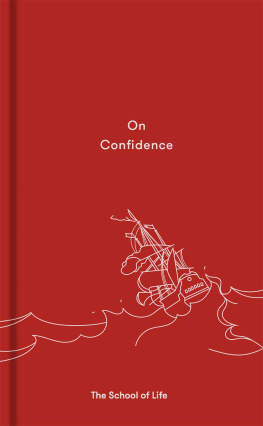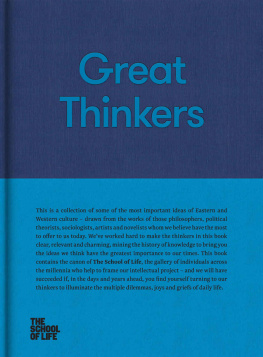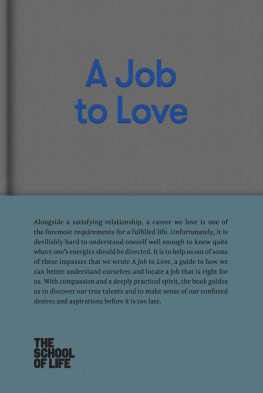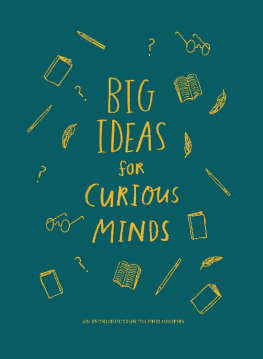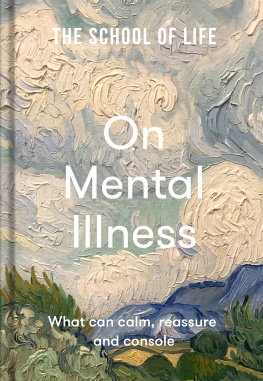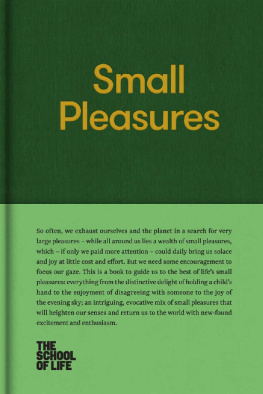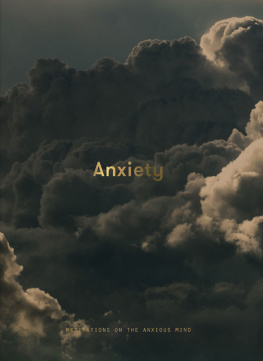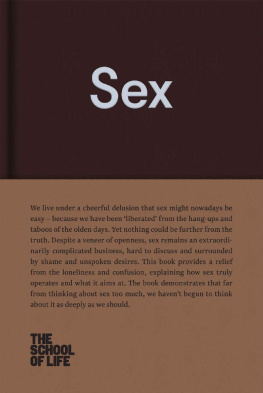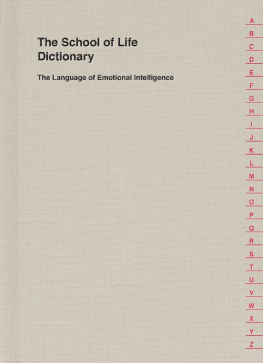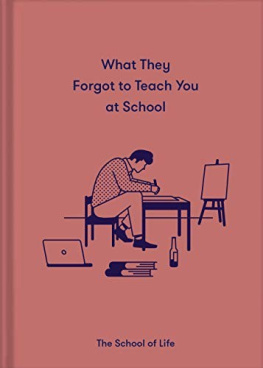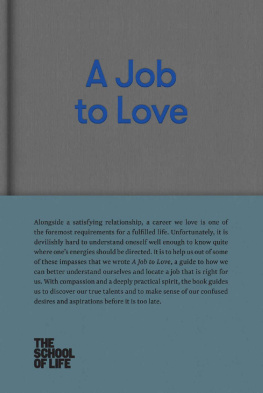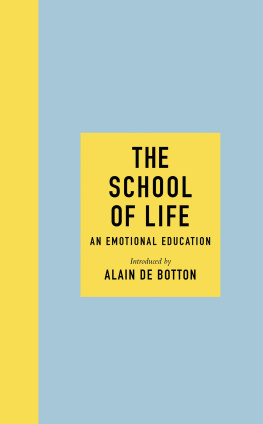The School of Life - How to Travel
Here you can read online The School of Life - How to Travel full text of the book (entire story) in english for free. Download pdf and epub, get meaning, cover and reviews about this ebook. year: 2018, publisher: The School of Life Press, genre: Home and family. Description of the work, (preface) as well as reviews are available. Best literature library LitArk.com created for fans of good reading and offers a wide selection of genres:
Romance novel
Science fiction
Adventure
Detective
Science
History
Home and family
Prose
Art
Politics
Computer
Non-fiction
Religion
Business
Children
Humor
Choose a favorite category and find really read worthwhile books. Enjoy immersion in the world of imagination, feel the emotions of the characters or learn something new for yourself, make an fascinating discovery.
- Book:How to Travel
- Author:
- Publisher:The School of Life Press
- Genre:
- Year:2018
- Rating:3 / 5
- Favourites:Add to favourites
- Your mark:
- 60
- 1
- 2
- 3
- 4
- 5
How to Travel: summary, description and annotation
We offer to read an annotation, description, summary or preface (depends on what the author of the book "How to Travel" wrote himself). If you haven't found the necessary information about the book — write in the comments, we will try to find it.
How to Travel — read online for free the complete book (whole text) full work
Below is the text of the book, divided by pages. System saving the place of the last page read, allows you to conveniently read the book "How to Travel" online for free, without having to search again every time where you left off. Put a bookmark, and you can go to the page where you finished reading at any time.
Font size:
Interval:
Bookmark:
How to Choose a Destination
Our societies are not shy about presenting us with options, of course, but they are also content to leave us alone with the many deeper complexities beneath the business of choosing.
A satisfying answer is less simple than it seems, for it requires us to have a deep understanding of ourselves, a good grasp of the nature of the world and an implicit philosophy of happiness.
Every destination has a character: that is, it emphasises and promotes a particular aspect of human nature. Some, like the long, empty beaches of South Australia, invite us to serenity; others, like the suburbs of Amsterdam, reinforce the pleasures of bourgeois sobriety. Los Angeles speaks to our dormant worldly ambitions and foregrounds a less squeamish attitude to money; Miami or Rio de Janeiro can loosen inhibition and reserve and tug us towards a relaxed sensuality.
The destination we find ourselves drawn to reflects an underlying sense of what is currently missing or under-supported in our lives. We are seeking, through our travels, not just to see new places, but also to become fuller, more complete beings. The destination promises to correct imbalances in our psyches, for we are all inevitably a little lacking or excessive in one area or another. The place we go to should, ideally, help to teach us certain lessons that we know we need to hear. Our destinations are a guide to, and a goad for, who we are trying to become.
To make a wise choice about where to travel, therefore, we should look first not so much at the outer world but at the inner one. We need to ask ourselves what is missing or presently too weak within us, and on that basis, set about identifying a location somewhere on the planet in the wilderness or a city, in the tropics or by a glacier with the power to help us develop into the sort of people we need to become.
Travel accedes to its true nobility when we ensure that the physical journey can support a well-defined inner journey towards maturity and emotional health.
What Is Exotic?

Our societies have a strong sense of what makes a destination exotic. Normally, the word is associated with palm trees, temples to unfamiliar gods, humid heat and unknown animals.
But, stripped to its essence, exotic has nothing to do with the prescriptive list of places with which it is typically associated. It merely means anywhere we yearn to go which we suspect has something important to teach us. Each of us is likely to have a private atlas of destinations that sound exotic to our ears, and which we need the courage and patience to unearth and bring into focus. The exotic is evidence of what is missing in ourselves.
We might be inspired to follow our own definitions of exoticism by the example of the nineteenth-century politician and writer Benjamin Disraeli. In one of his novels, Coningsby, the central character a thinly disguised version of the author develops a fascination for the factories and heavy industry of northern England. Though he and his friends have been used to holidaying in the countryside, the narrator admits that what would be truly exotic for him would be to go and spend two weeks investigating steel mills, cotton factories and coal mines. He does so, and the experience transforms him into a more serious and resolute person.
The modern equivalent would be someone cancelling a break in southern Spain to take a life-expanding trip to the appliance factories of the Ruhr valley or the data-storage centres of Montana.
Sadly, too often, were shy about investigating what might really be exotic to us. We may end up in more clichd exotic places from a shyness about locating and declaring our true interests. Were often still at the dawn of properly knowing ourselves. At least we can be assured that no one will mock or say were weird if we reveal were off to Phuket or Barbados. But what is properly exotic to us might lie somewhere quite different, in the suburbs of Yokohama, a hilltop retreat in Bavaria or the Norwegian hamlet of Sveagruva.
We should dare to ask ourselves what feels properly exotic to us even if it has no palm tree anywhere in the vicinity and occupies no space in any brochure and ensure we have the resolve to pay proper homage to it in our next itinerary.
The Suspicion of Happiness
Enjoying life is, in theory, deeply desirable, but wed be wise to note how challenging it can be in reality a fact with which our travels tend to confront us starkly. Suddenly, for a little while, by the pool or in the mountains, we may have nothing to do other than to be happy. The prospect can be truly alarming.
We tend to have three big fears:
i) If I settle back, throw away my cares for a time and enjoy what I have, I will lose the will to strive which has been responsible for everything I have achieved to date.
ii) Enjoying beauty and comfort is selfish. There is, after all, simply so much suffering around.
iii) Enjoying life is not serious.
In Aesops famous fable, The Grasshopper and the Ant, all summer long, the ant labours away and when winter comes, she has enough food to survive. All summer long, the grasshopper enjoys herself and is starving the next winter. The moral of the story is likely to have burnt itself into our consciousness from a young age. Relaxation can be dangerous.
But none of our three fears stand up to closer examination:
i) We can retain a sure hold on our striving-inducing dissatisfactions and, at the same time, occasionally savour the fragile harmony and beauty of a moment. In any case, unless we learn how to appreciate what we have, there is no point striving for more. Further gains are only worthwhile if our appreciative capacities are already functioning properly.
ii) Appreciation does not rule out compassion. Indeed, the more satisfied and rested we are, the more strength we have to bring to bear on the troubles of others. Being personally happy generates the best possible basis for helping to alleviate the griefs of strangers and friends.
iii) We dont have to enjoy life the way the adverts tell us: we can carve out our own vision of pleasure, every bit as serious and dignified as we wish it to be.
We should go easy on ourselves for needing a little encouragement to accept a very unfamiliar situation: a few moments of happiness.
Anxiety
A huge motive for travelling is the search for calm. But we should be modest about how calm we can ever be. We are, after all, human beings creatures for whom serenity is not a native state.
A degree of anxiety is fundamental to our nature for well-founded reasons:
Because we are intensely vulnerable physical beings, a complicated network of fragile organs deeply affected by the vagaries of our outer and inner worlds.
Because we can imagine so much more than we can ever have and live in mobile-driven, mediatised societies where envy and restlessness are constants.
Because we are the descendants of the great worriers of the species (the others having been trampled and torn apart by wild animals) and because we still carry in our bones into the calm of the jasmine-scented holiday resort the terrors of the savannah.
Because we rely for our self-esteem and sense of comfort on the love of people we cannot control and whose needs and hopes will never align seamlessly with our own.
We should gently laugh at the challenges of relaxation. There is no need on top of everything else to be anxious that we are anxious. The mood is no sign that our lives have gone wrong, merely that we are alive.
Font size:
Interval:
Bookmark:
Similar books «How to Travel»
Look at similar books to How to Travel. We have selected literature similar in name and meaning in the hope of providing readers with more options to find new, interesting, not yet read works.
Discussion, reviews of the book How to Travel and just readers' own opinions. Leave your comments, write what you think about the work, its meaning or the main characters. Specify what exactly you liked and what you didn't like, and why you think so.


